The forgotten history of female genital cutting in the United States

By: Sara Khattak Female genital cutting (FGC) is a practice involving the partial or total removal of external female genitalia or other injury to female genital organs for non-medical reasons. While FGC is a form of gender-based violence that is often mistakenly understood to only occur in certain cultural traditions in Africa and the Middle East, the occurrence of FGC has a history in the U.S. that is less widely known. Understanding the history of FGC in the U.S. is crucial for recognizing the global nature and impact of FGC, and for understanding how to address and end the harmful practice. In the late 19th and early 20th centuries, FGC was practiced in the U.S. and U.K. primarily by medical professionals. Despite the lack of scientific evidence supporting its effectiveness, FGC was often carried out as a medical treatment for various perceived medical and psychological conditions, including hysteria, “lesbianism,” and excessive masturbation. Another practice that should be considered a form of FGC is the “husband stitch.” The “husband stitch” refers to the practice of adding an extra stitch during the repair of a perineal tear or episiotomy after childbirth, ostensibly to tighten the vaginal opening for increased male sexual pleasure. Just this year, a lawsuit was filed in California against an OB-GYN who for decades allegedly performed FGC on patients. These practices were influenced by prevailing attitudes toward women’s sexuality and health of the time period, which included misconceptions about the female anatomy, a tendency to pathologize women’s sexual desires, and a patriarchal medical system that often prioritized male sexual pleasure and control over women’s bodily autonomy and well-being. Clitoridectomies fell out of popularity in the United States in the mid 1900’s, and by 1977 were no longer covered by insurance. At the federal level, however, FGC wasn’t prohibited until 1996. With the passage of a federal law it became illegal to perform FGC on a girl under the age of 18, or for the parent, caretaker, or guardian of a girl under the age of 18 to facilitate or consent to FGC being performed on her. Transporting a girl for the purpose of FGC became a punishable offense in the U.S. in 2013. Even after FGC stopped being a legally recognized medical practice, and Congress passed a federal law making it illegal to perform, there were still reports of FGC being performed by health professionals in secrecy. In fact, in 2018, a medical doctor in Michigan was charged with performing FGC on minor girls who had traveled to Michigan from other states to undergo the practice. It was then reported that Dr. Jumana Nagarwala was a part of a secret network of medical providers who performed FGC on hundreds of girls in the U.S. The case triggered significant legal and ethical discussions in the media, amongst anti-FGC advocates, and legislators, not only about FGC, but also about children’s rights and medical ethics. It was also reported that FGC was occurring in some white fundamentalist Christian communities. The persistence of FGC in these communities underscored the need for a broader societal reckoning with how cultural and religious beliefs intersect with human rights, even within demographics not typically associated with this issue. However, disappointment arose when the 2018 case was eventually dismissed on a technicality, relating to how the original law banning the practice was passed by Congress. This set back highlights the challenges in addressing FGC within the current legal frameworks. As a response, Congress passed the Strengthening the Opposition to Female Genital Mutilation Act of 2020, also known as the Stop FGM Act 2020, to ensure that FGC remained illegal to perform on a girl in the United States. Laws on FGC also vary at the state level. In Connecticut, for example, there are currently no state-level anti-FGC laws. The CT Coalition to End FGM/C, a survivor-led organization, has been working since 2020, advocating for the passage of laws that protect children from FGC and support survivors. Today, various efforts are being made to end FGC in the U.S. through education, advocacy, and community outreach programs. Educational initiatives aimed at informing healthcare providers, educators, and the general public about the harms of FGC and the legal implications of participating in or condoning the practice are being carried out by community-based organizations across the country. In the last 3 years, the Department of Justice, Office of Victims of Crime, funded several programs aimed at preventing and responding to FGC, including grants for community-based organizations and law enforcement training initiatives on the practice. Despite these efforts, significant challenges remain. One of the primary obstacles is the enforcement of the laws against FGC, as it can be difficult to detect or prove cases of the practice occurring. Additionally, there is resistance to ending the practice in some communities where FGC is seen as a social norm that must be done in the name of tradition, as a rite of passage, or due to it being an identity marker. Changing these deeply entrenched social norms requires sustained and sensitive engagement with community leaders and members from impacted communities. Survivors of FGC play a crucial role in the movement to end the practice. By sharing their stories, survivors help to humanize the issue and bring attention to the physical and psychological trauma caused by FGC. Their voices are powerful tools for advocacy and education, helping to shift public perception of the practice and inspire action against it. A large part of Sahiyo’s mission is working with survivors to share their stories and experiences, to inform communities, governments, and the public about the harms of FGC. These stories are critical in helping to enforce and create laws that address FGC because those who have gone through the practice have the most knowledge and understanding of why and how it should be prevented. If you want to learn more about Sahiyo’s work with survivors, listen to survivor stories here.
New Report from the Population Institute on GBV: “Behind Closed Doors: Exposing and Addressing Harmful Gender-Based Practices in the United States”
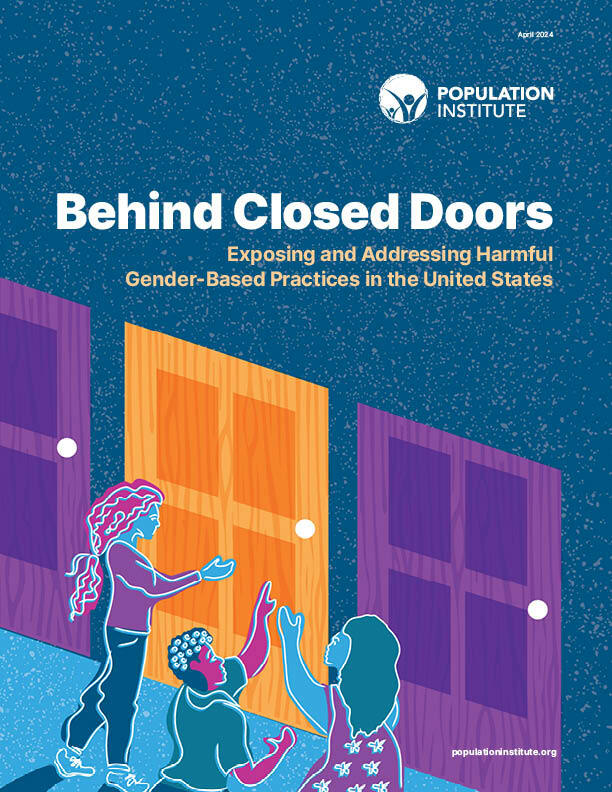
Read more in “Behind Closed Doors: Exposing and Addressing Harmful Practices in the United States.” Sahiyo is proud to help announce the publication of a new report by the Population Institute a nonprofit that advocates for gender equality and universal access to sexual and reproductive health services, titled, “Behind Closed Doors: Exposing and Addressing Harmful Gender-Based Practices in the United States”. The report tackles various forms of gender-based violence (GBV) occurring in the United States including female genital mutilation/cutting (FGM/C); child, early, and forced marriage/union (CEFMU); femicide, andvirginity testing. The report seeks to emphasize how prevalent these practices are in the United States, as they are often dismissed as harms that occur in foreign countries or other cultures, not here in the United States. However, these forms of GBV are increasing in the U.S. As reported by the Center for Disease Control and Prevention, with more than 500,000 women and girls are estimated to have undergone or are at risk of undergoing FGM/C in the US. The Tahirih Justice Center reports that at least 300,000 minors are estimated to have been married in the United States between 2000 and 2018. While theViolence Policy Center states that the rate of gender-based murder in the U.S. continues to be the highest amongst high-income countries, with a reported 2.2 per 100,000 women being intentionally killed in 2021. Women in the U.S. are 28 times more likely to be murdered with a gun than women in peer countries. These statistics highlight the need for educating people in the U.S. about the prevalence of various forms of GBV. This report also hopes to bring this crisis to the attention of U.S. policymakers, and other government officials who cansupport advocating for culturally competent legislation, survivor-focused initiatives and programs, and comprehensive sexuality education to counter these harms. Gender-based violence affects us all. Let’s create a culture of support and solidarity to uplift and empower survivors. Read about the widespread nature of harmful gender-based practices in the United States in the Population Institute’s latest report, “Behind Closed Doors: Exposing and Addressing Harmful Gender-Based Practices in the United States”.
Training the San Francisco Domestic Violence Consortium on FGC in honor of Zero Tolerance Day for FGC.
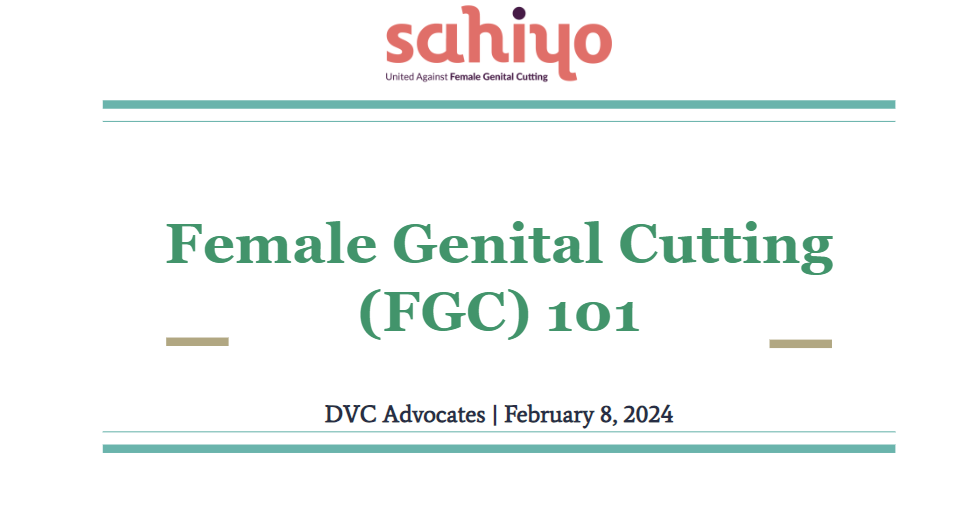
We are delighted to share insights from a training session hosted by Sahiyo in partnership with the San Francisco Domestic Violence Consortium (SF-DVC) on February 8, 2024. Our “FGC-101,” training aimed to shed light on the complex issue of female genital cutting (FGC) and uplift the ongoing collaborative efforts between Sahiyo and AWS on expanding gender-based violence (GBV) services to support survivors of FGC. This training was delivered to 16 advocates and community-based attorneys from the San Francisco Bay area. Led by Sahiyo’s Executive Director, Mariya Taher, and T&TA Coordinator, Aries Nuño, and Orchid Pusey from the Asian Women’s Shelter the training provided a comprehensive overview of FGC, including its physical and psychological impacts, global and U.S. perspectives, effective strategies for supporting survivors. These positive reflections from the participants underscored the importance of our collaborative efforts to address GBV and the value of providing informative and engaging educational experiences: “Thank you for your work! Looking forward to learning more and I appreciate AWS’s leadership on this matter.” “Thank you for a super engaging presentation! I learned a lot.” This initiative is part of our ongoing commitment to educate, engage, and empower advocates, enhancing their ability to offer crucial services to those affected by FGC. We extend our gratitude to the participants for their active engagement and to the San Francisco Domestic Violence Consortium for their partnership! For more training and technical assistance information contact aries@sahiyo.org.
A Plan in Action: Reflecting on the 2023 Peer-to-Peer National ARP Convening
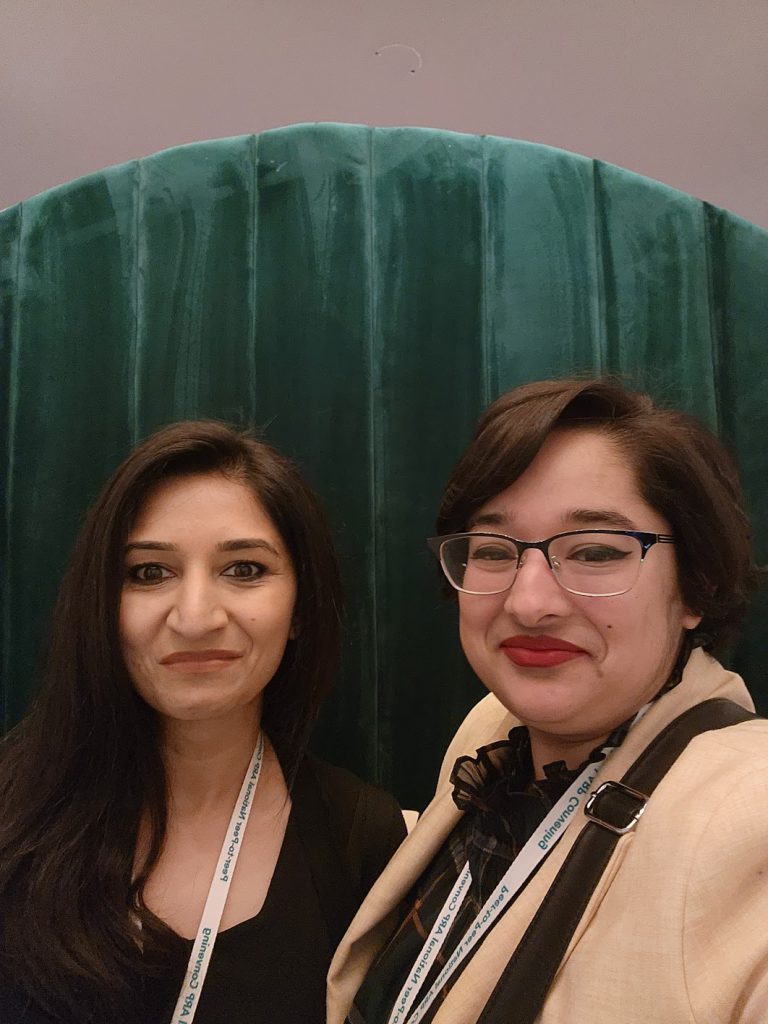
By Umme Kulsoom Arif This past October, I had the privilege of traveling to Washington DC and meeting with Samman Masud, Sahiyo’s Community Engagement Coordinator. Both of us attended the 2023 Peer-to-Peer National American Rescue Plan (ARP) Convening as representatives of Sahiyo, one of over 40 non-profit organizations granted awards as part of the ARP Support for Survivors Program. Without hyperbole, it was magnificent. The work to end gender-based violence in our many communities is a monumental task. There are too many days where I think of it in the same way I think of Sisyphus pushing his boulder up the hill, only to have it roll back down the moment he gets close to completion — neverending. This frustration was echoed in the stories of hardship shared by representatives of the various non-profit organizations seeking to serve and support their communities. And yet, here we are. Pushing that boulder. Doing the work, because the work needs to be done. Culturally specific communities are just that — culturally specific, each one with unique traditions and unique needs. Over the course of the three day conference, speakers emphasized the need to invest in organizations that understand the communities they serve, in providing grassroots organizations the space and financial support they need to do the work that must be done. For Sahiyo, the ARP grant provides the opportunity to expand our annual Activists Retreat, that annual opportunity for survivors and activists to come together for community, companionship, and healing. These retreats serve as an essential part of Sahiyo’s activism—and our self-care. Activism, as I once emphasized before, is work. Occasionally lonely work, as one finds themselves at risk of being ostracized by their communities for speaking up and speaking out. In this way, the ARP grant allows Sahiyo the opportunity to empower survivors and activists by providing retreat attendees the space to talk about their experiences and the tools to educate, to have meaningful conversations in their communities. It is Sisyphean work sometimes — these conversations must happen more than once, the violence cannot be stopped in a single day. As we watch another khatna-related prosecution begin, this time in Texas, I wonder just how many volunteers and activists are waiting to see if the 2018 prosecution in Michigan will repeat itself? To me, the beauty of the 2023 ARP Convening was in the stories, both in sorrow and in triumph. Speakers from the Asian-Pacific Institute on Gender-Based Violence, Ujima, National Organization of Asians and Pacific Islanders Ending Sexual Violence, and the National Indigenous Women’s Resource Center — as well as the sub-grantees of all of these organizations — spoke candidly of how they also struggled when trying to advocate for their communities, about the need for support from government grants that also allowed them to do the work in a manner that worked for them. Most critically, the speakers emphasized the need for advocates to work together to uplift and support other non-profit organizations. There is still a lot of work to be done to end gender-based violence, both in acknowledging its existence in various communities and in changing the cultural mores that perpetuate it. The hill we climb feels steep, but the boulder we push up that hill is not one we have to shoulder alone. I look forward to the day we best Sisyphus and crest that hill, for a future free from violence. If not for me, then for those who will live in the world I leave behind.
Exploring FGC with GBV Service Providers
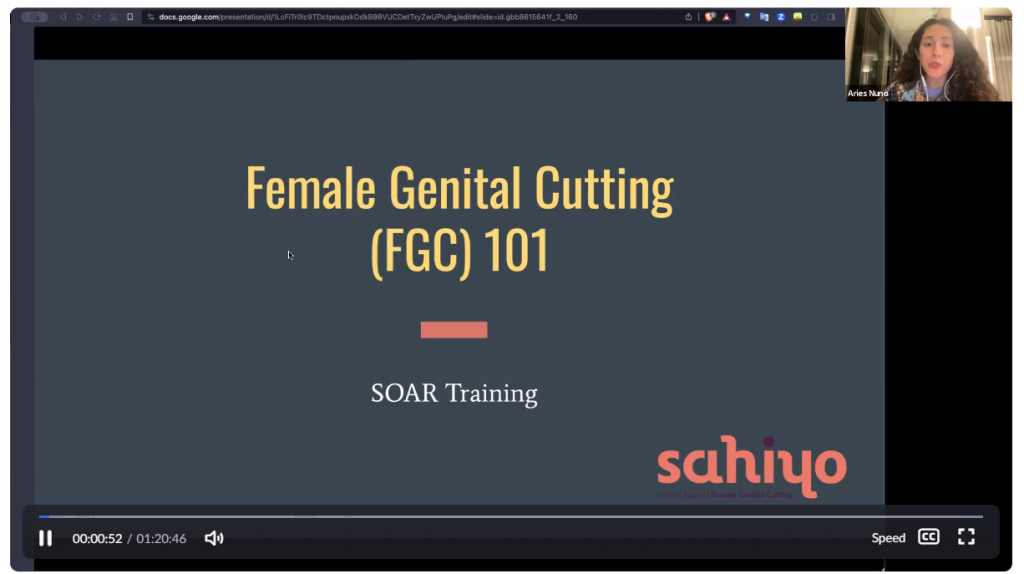
Female genital cutting (FGC) is an often overlooked facet of gender-based violence (GBV) in the United States. On November 2nd, Sahiyo joined forces with South Asian SOAR to host a training session tailored for service providers in the GBV sector. Facilitators delved into the complexities of FGC, providing attendees with insights into FGC’s various forms and the emotional and physical impacts of this harmful practice. Compelling stories from survivors, shared through Sahiyo’s Voices to End FGM/C project, shed light on the intersectional identities of survivors and their emotional journeys, as well as their inspiring advocacy efforts. The training also explored the cultural contexts of FGC, examining its presence globally, and more specifically in the U.S., receiving an overview of current U.S. laws related to FGC. A reflection discussion prompted conversations about effective ways to engage with the general public and survivors on the issue of FGC. With more than 15 SOAR coalition members in attendance, this knowledge equips service providers to offer comprehensive support, bridging the understanding gap surrounding the complexities of FGC. As one participant stated: This session opened the other side of GBV, which is often absent from our day-to-day narratives. Thank you????. If your organization is interested in inviting Sahiyo to conduct a training session, please contact Sahiyo’s Training and Technical Assistance Coordinator Aries Nuño for more information.
Survivors Speak: Stories of Healing and Action
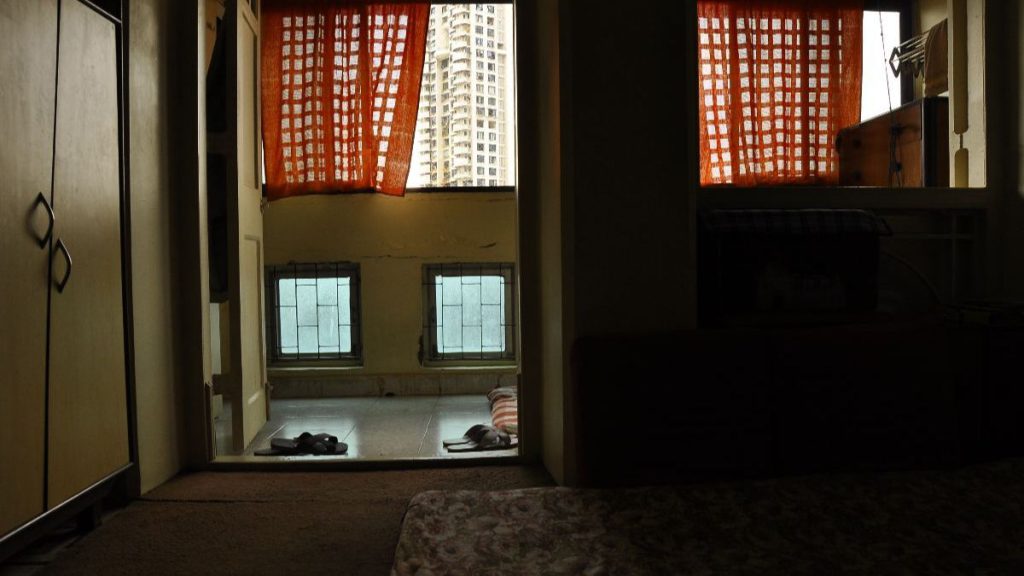
Please join Sahiyo, Asian Women’s Shelter, and Silence Speaks on November 28th at 4 pm Pacific / 7 pm Eastern for an informal one-hour webinar on trauma-informed storytelling to address gender-based violence. In honor of the 2023 16 Days of Activism Against Gender-Based Violence global campaign (November 25 through December 10), the three organizations are collaborating to offer a safe, online space for individuals to learn about the theory and practice of behind their years-long trauma-informed, collaborative work to support survivors of domestic and sexual violence, female genital mutilation and cutting (FGM/C), and other forms of abuse. In 2018, their Voices to End FGM/C collaborative project was initiated, today it, showcases 75 compelling stories, featuring participants from 19+ countries whose stories have garnered over 99,000 views across multiple social media platforms. These impactful narratives have not only reached a wide audience but have also been the focal point of 13+ public video screenings, in addition to serving as tools for education, community mobilization, and advocacy for justice. The webinar on Nov 28th is being hosted to foster solidarity amongst survivors who have shared their stories and who hope to do so. Register here!
South Asian SOAR releases national report, includes female genital cutting
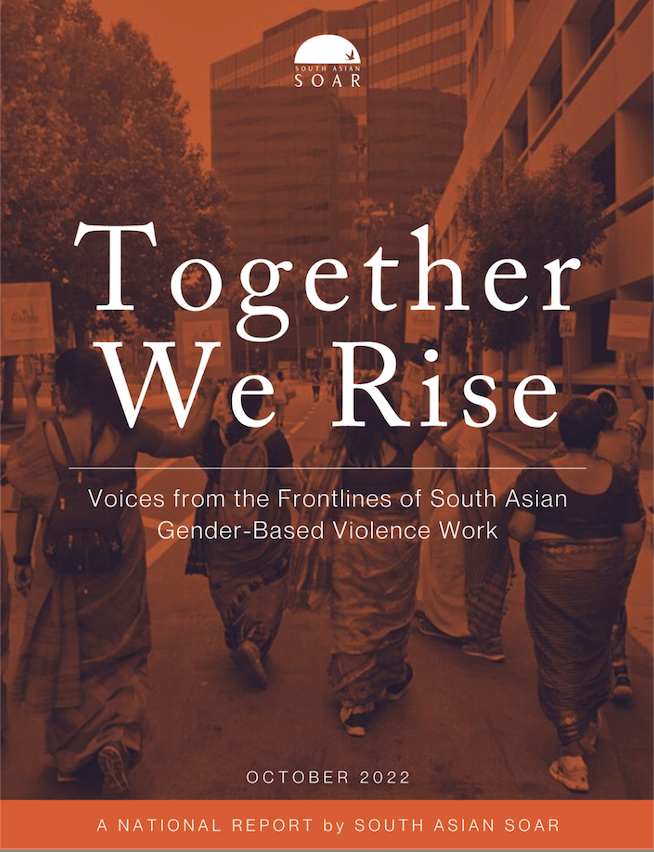
This October, South Asian SOAR (Survivors, Organizations, and Allies — Rising, or SOAR), released the Together We Rise report. This collective of survivors, 30+ organizations, and allies, of which Sahiyo is a member of, works to advance the national movement to end gender-based violence (GBV) in the South Asian diaspora within the United States. This report is a culmination of key findings from listening sessions held with its network, which spans across 13 states, in partnership with the Asian Pacific Institute on GBV (API-GBV). It sheds light on the challenges and needs of South Asian survivors, frontline organizations, communities, and the anti-GBV movement. Also included in the report is female genital cutting (FGC) as a form of GBV that is found amonst the South Asian Diaspora, as well as the limited services available to address this in a culturally competent manner. Sahiyo is proud to have contributed to this report and the work of South Asian SOAR. To read the report, visit www.togetherwerise.report.
Sahiyo U.S. joins South Asian SOAR as member organization
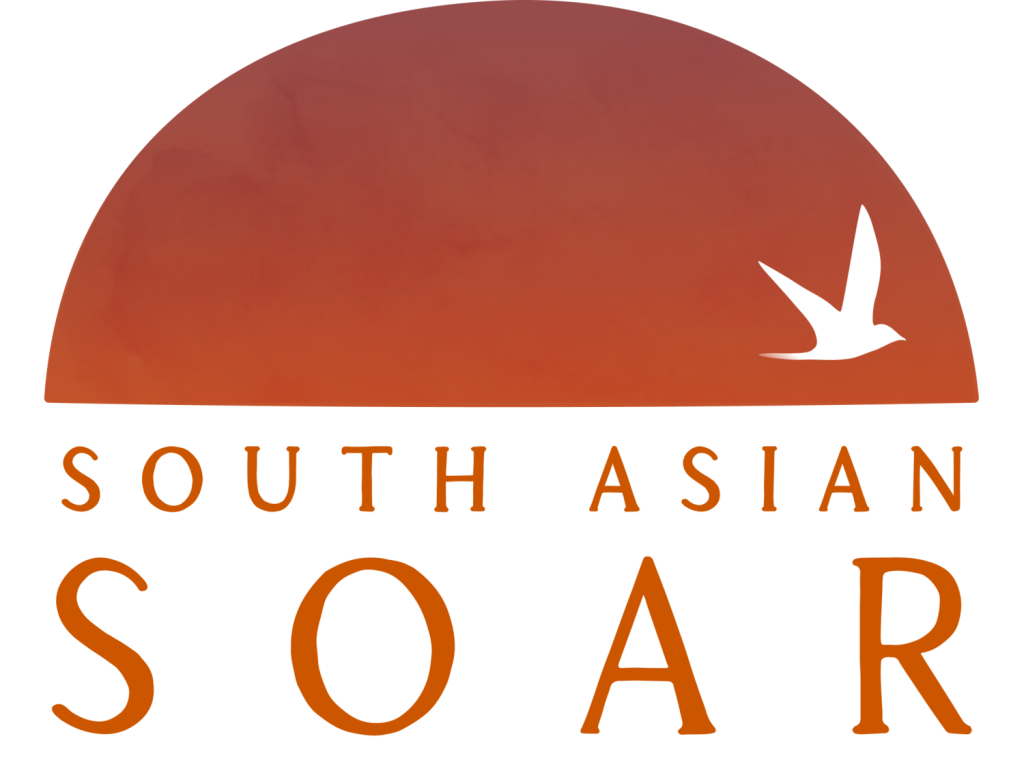
Sahiyo U.S. is grateful to be welcomed as one of the newest member organizations of South Asian SOAR, a U.S.-based coalition working to end gender-based violence (GBV) in the South Asian diaspora. SOAR is a national collective of survivors, 30+ organizations, and allies who are passionate about changing the high prevalence of GBV among South Asians (over half of South Asians experience some form of GBV). SOAR works to strengthen the field that serves survivors, shift the narrative through data and community-based research, and support the healing and leadership of survivors through storytelling. By bridging urgent, direct-service work with national-level action and advocacy, SOAR is co-creating a future of joy, healing, and justice. Learn more about South Asian SOAR’s work.
